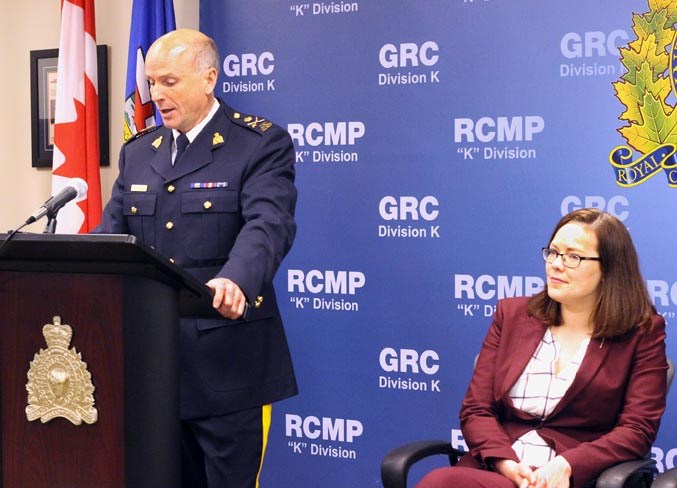After targeting a civilian with an outstanding warrant, Kevin Lambert and his newly-formed RCMP unit arrested a man from a hotel lobby. The man, who had been known to be problematic in the Chestermere community, was later found to be associated with various hand guns and drugs left behind in his room. "We did some research and found out the location he was staying in Calgary," said Lambert, who until three weeks ago worked for Cochrane RCMP detachment. "He didn't want to go to jail because he had some drugs on him and a gun ... there was a fight in the hotel lobby with him." The arrest was one of 30 made by the RCMP's new Southern Alberta District Rural Crime Reduction Unit (SAD CRU) - along with 234 charges laid - since it came into operation in February. "These are early results, but I believe they are clear signs that a co-ordinated and intelligence approach to policing will continue to work in this province," said Deputy Commissioner Todd Shean. The CRU's goal is to find and stop the root of the majority of rural crimes, committed by repeat offenders. “Our Crime Reduction Units will find and arrest those individuals who hurt our communities the most,” Shean said. The unit's formation comes in the wake of a spike of rural crime in recent years. In Cochrane, from 2014 to 2015, crimes nearly tripled from 1,129 to 3,101. The current data from the Alberta government - data from 2016 - show crime has maintained a rate above 3,000 incidents. In March, the province announced a $10-million injection into the efforts to reduce rural crime, some of which went toward helping with establishing four district-level CRUs across the province. "Our $10-million action plan is already making a significant, immediate difference in the lives of rural Albertans. Across this province, Crime Reduction Units are arresting repeat offenders, laying charges, and recovering stolen property – and this important work will continue,” said Kathleen Ganley, minister of Justice and Solicitor General. With the large geographical area RCMP have to cover, the unit is hoped to take off pressure from frontline officers by doing the investigative work. The plain-clothed, six-person team tracks reoccurring crimes based on investigations, tips and analytics and makes arrests based on that information, rather than responding to everyday calls. One member, Cody Burton, described the team as the non-emergency responders. "I'm not in uniform, I don't drive a police car with lights on top," said Burton. Prior to his last post in Gleichen, Alta., he has worked in plain-cloth position in Calgary with the RCMP and in total has stacked 14 years as a Mountie. "We're not responding to calls, we're deciding what we should be working on and we decide based on crime hot spots and its intelligence lead as well." Burton said recently, his team made an arrest in Turner Valley and shut down a drug house operating in the rural community. "It was right in the centre of town, it was a drug house; people were coming and going all day, all night," he said. "Usually drug users are supporting their habits by property crime. So when people like that are in a concentrated area, the property crime rate goes up." With the help of the Turner Valley RCMP, Burton said they were able arrest and lay charges against the residents of the home. "They're seeing less traffic coming to the residence and with less traffic is less crime. So it comes quick. I guess it's not a spectacular (story) but it's a feel good one because you know that it's going to make a difference in a hurry," he said. Burton couldn't go into specifics on the unit's tactics for surveillance and investigation but he did say one key is tips from the public. "You would notice if ... there was vehicles coming and going to your neighbour's house or foot traffic coming to your neighbour's house all the time and you watch their visitors and they're only staying two to three minutes," he said. Rosemary Lindsay, President of the Cochrane Foothills Protective Association Rural Crime Watch, added that tips from the public don't fall into a "black hole." Rather, the tips may help the unit piece together crime in an area. "We encourage everyone to be alert, if you see something – say something. You don’t know what piece of the puzzle you may be providing,” Lindsay said. Another key for the Southern Alberta CRU is Darci O'Donnell, an RCMP analysts. "My day looks like going through a lot of pros files," O'Donnell said. "That's our operator's system where all the calls that come in go into one data base. I go through files, analyze them for whether there's trends, series, those kinds of things." "A lot of the time when we do see series, they'll be break and enters or theft of motor vehicles," she said. "You'll actually be able to follow the dots (geographically)."




